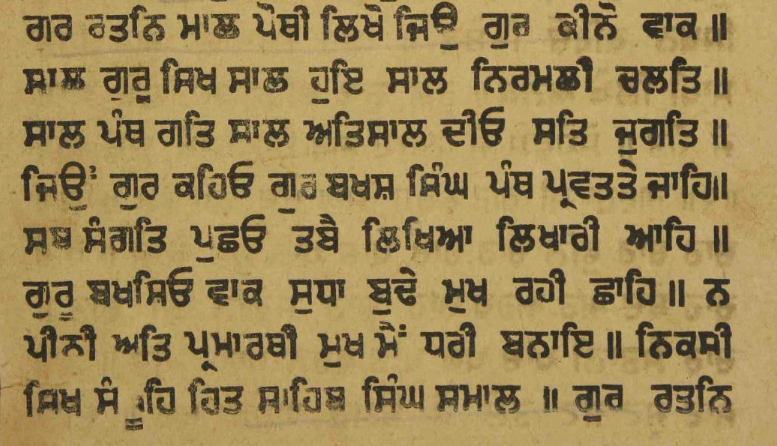Spotlight on Bhai Raam Koer Ji (Bhai Gurbaskh Singh Ji)

Bhai Raam Koer Ji were a steadfast Sikh from the familial lineage of Baba Budhha Ji. They were the son of Bhai Gurdithaa Ji. Bhai Gurdithaa Ji let go of their breaths due to the separation felt by the Shaheedi of Guru Tegh Bahadur Sahib Ji.
-
Bhai Raam Koer were born in 1729 Bikrami (1672 CE) and due to their Father’s Akaal Chalaanaa in 1732 Bikrami (1675), they became without support. The love for Sikhi was in their family and so, they began spending time at Anandpur Sahib. Slowly, a high spiritual state began to grow... they constantly remained in a meditative state and became a Brahmgiani. It was not that they were living a colourless life... after multiple wives dying, Bhai Raam Koer ended up having a total of 4 weddings but stayed in their detached ways through all of them. When riding horseback, they liked to have both their feet on one side of the horse. This was something of their own enjoyment. Bhai Sahib had a spiritual-seeking nature and a deep interest in history. This is why Bhai Raam Koer Ji asked questions relating to spirituality and history. In this research and eagerness, Bhai Raam Koer Ji gathered various Sakhee's attached to Guru Sahib and developed Panj Sau Saakhee: 500 Sakhee’s. This Gur Rathan Maal Pothi (500 Sau Saakhee) became the support for Kavi Santokh Singh JI’s Magnus Opus: Gurprathaap Soorya. Kavi Santokh Singh Ji took many of these Sakhis and presented them in further poetic form. Giani Giaan Singh (Khalsa Panth Pradhipakaa), Bhai Kaahn Singh Naabha (Mahaan Kosh), among many other scholars have mentioned that they have seen folios of the 500 Sakhis but they are not available anymore. Giani Giaan Singh had Panj Sau Sakhi first copied from the Mahant of Nainae-de-Kot, second copied from the children of Bhai Soora Multani, and thirdly copied from Shiv Raam Khathri from Agra. It is possible to find another copy somewhere in Malwa. There is a writing called Sau Saakhee related to Guru Gobind Singh Ji, this is actually just a part of Panj Sau Saakhee.
-
It is commonly believed that following the Jothee Joth of Guru Gobind Singh Ji, the Sad Sikh Sangat used to listen to Bhai Raam Koer’s Saakhees in order to develop the endurance and patience to withstand such a separation. Likhaaree Bhai Sahib Singh used to write them down. It was maybe 1781 or 1791 Bikrami when all of the Saakhee’s were compiled. However it may be, it can be confirmed that the Panj Sau Saakhee were compiled based on Purathan Janam Saakhee’s, dialogues, and directly from Guru Sahib’s narration. It can also be understood that Guru Gobind Singh Ji had supervised the narration of the Guru Sahibaan’s history and completed by the divine insight of the Perfect Brahmgiani Bhai Raam Koer Ji.
-
Bhai Sahib Ji had witnessed many political turns such as the attacks of Nadir Shah and Abdali. Witnessing the massacre of Sikhs and the rise of the Sikh Misl’s. One time, their village Raamdaas was robbed... the Pathan took all of the wealth and arrested Bhai Sahib Ji then brought them to Lahore. When they saw the carefree Fakeer nature of Bhai Sahib Ji then they regretted their actions. They said: ‘We have made a great mistake in stealing from this home, please tell us how we can return our stolen goods’. Bhai Sahib Ji stated: ‘You will not see any ropes attached to this hawk [meaning that they were not tied down to their wealth/property]. Seeing this carefree and unaffected nature, the Pathans became surprised and asked for forgiveness.
-
History points us to that time when Guru Gobind Singh Ji left their body on 21 Cheth 1763 Bikrami (1706 CE) and there was a Benti from Bhai Raam Koer Ji: ‘Maharaj! How can we receive Your Darshan?’ Then Guru Sahib said: When you go on the hunt, then you will be able to have Darshan’ With this said, Bhai Raam Koer Ji used to get up quite early in the morning to go hunt and especially kept a hawk with them.
-
Let us remember that after they were blessed with Amrit, Bhai Sahib Ji’s Name became Bhai Gurbaksh Singh Ji. They physically passed away at the age of 89 years old on 1 Saavan 1818 Bikrami (1761 CE).
-
PDF of Sau Sakhee as revised by Piara Singh Padam

